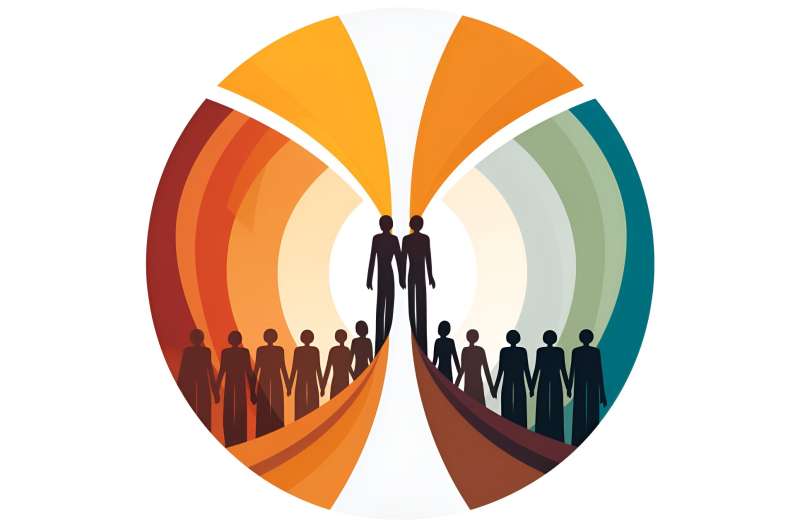This article has been reviewed according to Science X's editorial process and policies. Editors have highlighted the following attributes while ensuring the content's credibility:
fact-checked
peer-reviewed publication
trusted source
proofread
Study compares direct and indirect impact of dual versus single identification on attitudes toward minority groups

In a new study, the attitudes of non-Muslim American participants towards Muslim Americans who identified strongly with both parts of their dual identity—Muslim and American—were just as positive as their attitudes towards Muslim Americans who identified only as American. In addition, exposure to dual-identified Muslim Americans was linked to more positive attitudes towards non-American Muslims. The same was also found in the American-Mexican context.
Aharon Levy of Columbia University and Yale University, US, and colleagues present these findings in the open-access journal PLOS ONE on August 16, 2023.
Many prior studies have shown that people tend to have positive attitudes towards others who are part of their own social ingroup and negative attitudes towards outgroup members. However, people increasingly encounter individuals with dual or multiple social identities, and relatively few studies have examined people's attitudes towards others with dual identities that simultaneously include both an ingroup and an outgroup.
To help deepen understanding of such attitudes, Levy and colleagues conducted a series of survey-based analyses involving a total of several hundred American participants.
The researchers first evaluated non-Muslim American participants' attitudes towards Muslim Americans who identified more strongly as Americans (the ingroup), as Muslims (the outgroup), or as both, equally. They also conducted a similar analysis focused on Mexican Americans.
In the context of both Muslim Americans and Mexican Americans, the analyses showed that participants' attitudes towards people who equally strongly identified with both the ingroup and outgroup parts of their identity (dual-identified) were just as positive as towards those who primarily identified with the ingroup.
There were also signs of a "gateway group effect:" exposure to strongly dual-identified people was associated with more positive attitudes towards the relevant outgroup—that is, non-American Muslims or non-American Mexicans. However, when people with dual identities identified more strongly with the outgroup part of their identity (Muslim or Mexican), the gateway effect disappeared, and attitudes towards the outgroup sometimes became more negative.
The researchers acknowledge limitations to their study and outline how future research could further deepen understanding. Nonetheless, they note, their findings could help inform efforts to improve intergroup relations.
The authors add, "Many people believe that to be fully accepted by a host culture, minority groups must assimilate with the majority culture (e.g., Latinx immigrants becoming more American). However, our findings suggest that, in terms of intergroup attitudes, explicitly embracing both identities (e.g., Latinx & American) can be as beneficial as fully assimilating only to the majority identity."
"This means that minorities may not need to relinquish any part of their identity as long as they also identify with the majority group identity. Moreover, we have found that the positive influence of the dual identification is also extended to the corresponding outgroup (e.g., the relationship between non-Latinx Americans and Latin America), with the dual-identity group serving as a gateway to more positive intergroup attitudes."
More information: Levy A. et al., Ingroup love, outgroup hate, and the gateway group effect: Comparing the direct and indirect impact of dual versus single identification, PLoS ONE (2023). DOI: 10.1371/journal.pone.0287631 , journals.plos.org/plosone/arti … journal.pone.0287631
Journal information: PLoS ONE
Provided by Public Library of Science


















